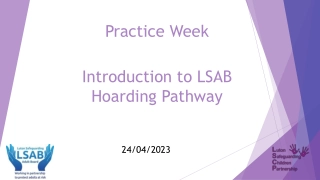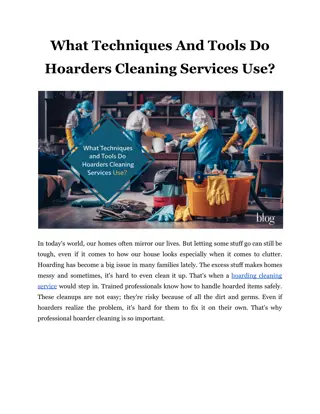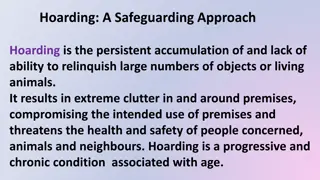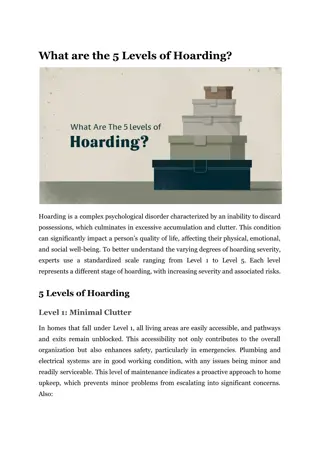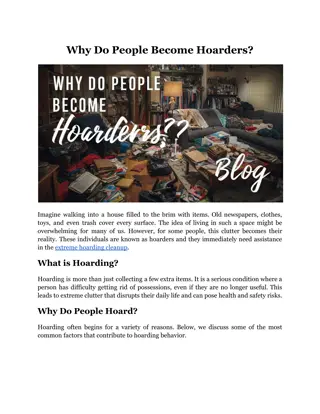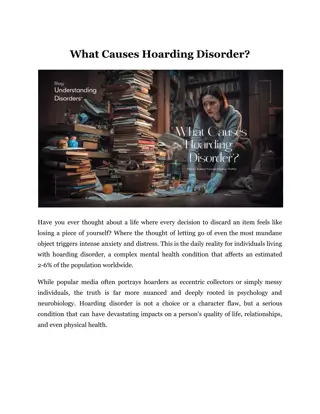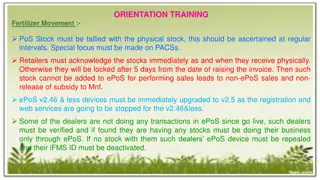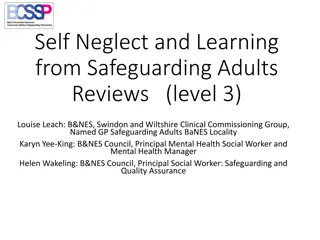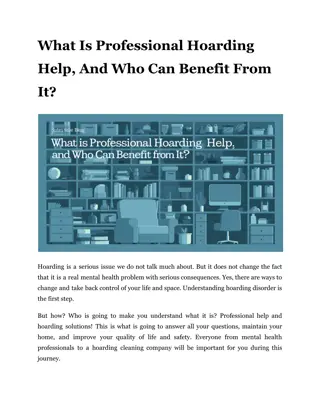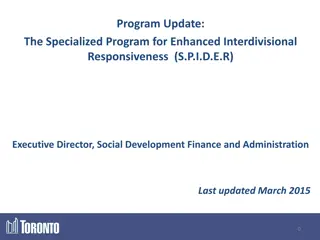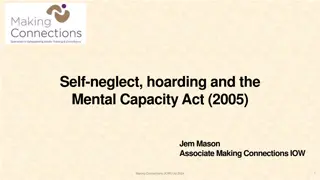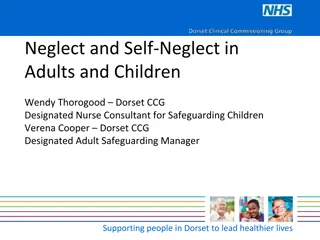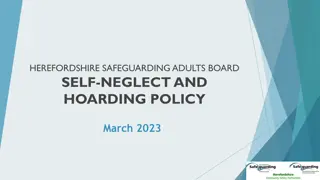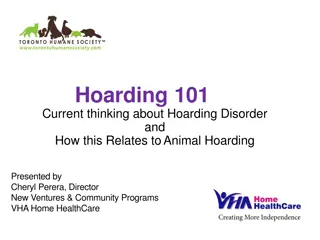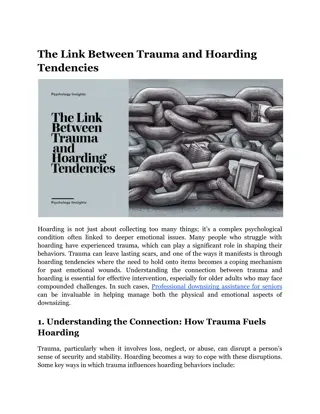Understanding Hoarding: Causes, Types, and Support
Hoarding disorder is a serious condition where individuals accumulate excessive items, leading to clutter and distress. Factors such as mental health issues, trauma, and family history can contribute to hoarding behaviors. Different types of hoarding, including inanimate objects, animal hoarding, an
1 views • 28 slides
What Techniques And Tools Do Hoarders Cleaning Services Use
In today's world, our homes often mirror our lives. But letting some stuff go can still be\ntough, even if it comes to how our house looks especially when it comes to clutter.\nHoarding has become a big issue in many families lately. The excess stuff makes homes\nmessy and sometimes, it's hard to ev
2 views • 6 slides
Premium Barrier, Fences, and Accessories for Construction and Events
Explore a range of high-quality barriers, fences, and accessories designed for construction sites, events, road sectioning, and road maintenance. Features include galvanized materials, quick deployment, versatility, and stability. From crowd barriers to hoarding panels and heavy-duty road barriers,
0 views • 7 slides
Understanding Hoarding Behaviors and Risks: A Comprehensive Overview
Hoarding is a serious condition that involves the accumulation of objects or animals, leading to extreme clutter and potential health and safety risks. This chronic behavior can result in fires, diseases, isolation, building collapses, and falls. The causes of hoarding vary from mental disorders lik
1 views • 15 slides
What are the 5 Levels of Hoarding?
Explore the five levels of hoarding and learn how to identify and address each stage. Get insights and practical tips to help manage hoarding behavior.
1 views • 5 slides
Why Do People Become Hoarders?
Explore the psychological reasons behind hoarding. Learn what causes people to hoard and how to help those affected.\n
6 views • 5 slides
What Causes Hoarding Disorder?
Discover the underlying causes of hoarding disorder. Learn about the psychological and environmental factors contributing to this complex condition.\n
1 views • 5 slides
Guidelines for Effective Management of Fertilizer Movement and Quality Control
Regular stock reconciliation, monitoring of dealer transactions, curbing hoarding practices, timely submission of subsidy claims, and strict quality control measures are essential for efficient management of fertilizer movement. Special emphasis on monitoring sales prices and ensuring compliance wit
0 views • 5 slides
Understanding Self-Neglect and Safeguarding in Adults
Self-neglect in adults involves a lack of self-care, neglect of personal hygiene, health, and domestic environment, as well as refusal of services. It can stem from physical or mental health issues, past trauma, hoarding as a coping mechanism,and low self-esteem. Learning about policies, Mental Capa
7 views • 39 slides
What Is Professional Hoarding Help, And Who Can Benefit From It
Discover the benefits of professional hoarding help and learn who can truly benefit from these essential services.\n
1 views • 5 slides
Enhancing Safety and Inclusion in Toronto Communities: The SPIDER Program
Tackling the issue of problem hoarding, the SPIDER program aims to reduce health and safety risks, coordinate responses, provide services, and drive systemic reforms in Toronto neighborhoods. By addressing vulnerability and promoting integration, the program strives for a safer and more inclusive co
0 views • 19 slides
Understanding the Theory of Demand in Microeconomics
The theory of demand in microeconomics explores the concept of consumer willingness and ability to purchase goods and services at various prices. Factors influencing demand include price, related commodity prices, income levels, consumer preferences, population size, and distribution of income. The
1 views • 13 slides
Understanding Self-Neglect, Hoarding, and the Mental Capacity Act (2005)
Self-neglect and hoarding are complex issues often intertwined with mental capacity challenges. The Mental Capacity Act (2005) outlines capacity assessments, decision-making criteria, and challenges faced by professionals in safeguarding individuals. Recognizing the need for trauma-informed care in
1 views • 16 slides
Addressing Neglect and Self-Neglect in a Complex Family Setting
In a poignant tale of neglect and self-neglect, a family comprising a bed-bound grandmother, a daughter with learning disabilities, and a history of abuse navigates challenging dynamics. With the intervention of healthcare professionals and a fresh perspective, issues of hoarding, sexualized behavio
1 views • 14 slides
Herefordshire Safeguarding Adults Board Self-Neglect and Hoarding Policy Overview
The policy addresses self-neglect and hoarding behaviors, emphasizing the broad spectrum it covers, including lack of self-care and failure to seek assistance for critical needs. It highlights the complexity faced by practitioners in balancing autonomy and duty of care. The background data reflects
1 views • 15 slides
Understanding Hoarding Disorder and Its Relation to Animal Hoarding
Explore the complexities of hoarding disorder and how it intertwines with animal hoarding behavior. Delve into the characteristics, practical tips, and service interventions related to hoarding. Learn from Cheryl Perera, Director of New Ventures & Community Programs at VHA Home HealthCare, about the
0 views • 33 slides
The Link Between Trauma and Hoarding Tendencies
Explore how trauma impacts hoarding tendencies, revealing why past experiences can lead to cluttered lives and emotional challenges.
1 views • 6 slides
